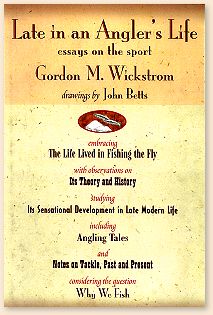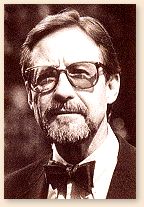Reviewed by Harry J. Briscoe
 Gordon Wickstrom has a winner in his new book, Late
In An Angler's Life, a collection of essays
and thoughts on the sport of fly-fishing. If you
are not familiar with Wickstrom, prepare yourself
for a treat. This is not your normal "me and Joe
went fishing" fly-fishing book. Gordon Wickstrom
is a retired professor of Drama (and a great many
other things) who has fished his entire life.
Unlike many of us though, he has paid a great deal
of attention to his thoughts and feelings while
fishing and preparing for fishing, and he has a
delightful and stimulating method of presenting
those thoughts and feelings.
Gordon Wickstrom has a winner in his new book, Late
In An Angler's Life, a collection of essays
and thoughts on the sport of fly-fishing. If you
are not familiar with Wickstrom, prepare yourself
for a treat. This is not your normal "me and Joe
went fishing" fly-fishing book. Gordon Wickstrom
is a retired professor of Drama (and a great many
other things) who has fished his entire life.
Unlike many of us though, he has paid a great deal
of attention to his thoughts and feelings while
fishing and preparing for fishing, and he has a
delightful and stimulating method of presenting
those thoughts and feelings.
In his introduction, he states:
"It is always later than we think.
Even when it is early, it's getting later,
always later in the angler's life. But we
hope, as we approach that defining lateness,
that things will make more sense...".
And so, Gordon offers us a thought-provoking series
of essays, observations, thoughts and musings that
help provide just that "sense." The work is sensitive
and eloquent throughout.
The topics in this book are wide-ranging. They
are presented in chapters that may only involve
a page or two (the longest is about 20 paragraphs),
but Wickstrom's obvious command of the language,
the syntax, the nuance, the grace and the style,
pack far more substance than one might expect
into each of those focused thoughts. I cannot
help but wish I had enjoyed the tutelage of
Professor Wickstrom as one of my professors of
English. The book is an entertaining and engaging
read, but it is far from a trivial travelogue of
adventures. Every essay has a thought, a point,
a question. Many are compelling "stoppers" that
will provoke you to personal thought, sometimes
to such a depth that you might find it a challenge
to allow yourself the journey. Many of these essays
provoke reflection about things that deserve reflection
as we each determine our own definition of the elements
of fly-fishing.
This is not a "heavy" book, full of conclusions,
pronouncements, edicts or preachings. It is not
a lecture and it does not drone on endlessly about
what's right or what's wrong or about the "good
old days." It does, however, assist one in
putting our pastime into perspective, into
explaining sometimes "why" we do what we seem
so much to enjoy doing. At a minimum, it causes
us to think about it.

Wickstrom has a widely varied background in arts,
sciences, and philosophies. In addition to the
references to the "standard" figures in fly-fishing
literature, he shares delightful connections to the
sport from the likes of Shakespeare, Cervantes,
Henrick Ibsen, Richard Brautigan and Zane Grey.
He provides fascinating morsels of history, art,
music and literature, and he ties it all to "us,"
as consumers, as partakers of the sport. The book
is tastefully accented with excellent line drawings
done by noted fly-fishing historian, John Betts.
His work adds a touch of extra class and substance
to the effort.
The book's chapters cover the broad state of the
author's (and our own) experiences from childhood
fascinations with what lies beneath the water's
surface, through youth, love and expectations,
and on into maturity and a wizened perspective.
He covers the "state" of fly-fishing, then and
now, the evolution of tackle and thought, flies
and fly-tying from hilarious childhood antics
of chasing down a rogue rooster for his prized
hackles through the conversion to lifeless modern
synthetic materials. There are chapters on the
tragedies associated with broken rods and the
tragedies of misdirected thought, modern angling
as a class struggle and as an artificial (and
often unfulfilling) outlet for beleaguered CEOs
(and the rest of us), of killing versus catching,
of talking to the fish, of big fish, of small
fish, and of no fish.
Late in An Angler's Life will entertain,
educate and amuse you. It will also cause you to think
and reflect. It will likely motivate you. After
reading Wickstrom's perspectives on things, I for
one, am going to pay more attention to my own
experiences, to the substance of the wanderings
that I am fortunate to enjoy. I am going to see
and hear and taste and smell things more closely.
Seems to me that the questions of one's fly-fishing
life might revolve around this, "Are we building a
base of true memories or just a photo-album as we
race about the world seeking fulfillment? Are we
understanding and appreciating what we are doing - or
are we just doing it?" My reading of this book
will cause me to stay a bit more alert. I recommend
it to you.
Selections from Late In An Angler's Life
Reflecting of a glass and foil painting..."It is
all so beautiful and evocative for me now, this
1930's Depression silhouette that once meant
almost nothing to me. Now it's become a central
metaphor in the life of a boy turned into and old
many trying find his way through surfaces."
"...Break one carbon rod and there's always a
new and identical one immediately to hand. But
break my eight-foot, five strips of Tonkin cane
and it's gone forever and ever and ever. The
world would be diminished by its loss...My old
tackle is indeed emblematic, a system of wonderful
relics, charged with the powers of the past and
representative of my generation, what we did and
who we were."
"The new angler, spending more of his income on
his fishing than ever before, is commonly seem
on airport concourses lugging rod tubes and
duffels toward his plane to the remotest
corners of the world...I suspect that this
venturing forth all over the place is underlain
by a deep anxiety about what our angler feels
is happening close to home, that his home waters
are fast being urbanized out from under him. The
irony that what supports his urban life and times
is exactly that which is destroying his fishing
may further contribute to his anxiety."
"Their interest in fishing is intense but with
less time to do it. Too often the year's fishing
is crammed into one or two frantic vacation trips,
nothing casual about it anymore. The image is
one of haste and stress."
"So, maybe there are two casts of the fly today,
two modes, two motives for the cast. First, and
now clearly in the ascendance, is that with the
carbon rod, with its sharp, fast, aggressive
power stroke that more resembles attack than
delivery - the appropriate cast for a world of
war and rumors of war..." ..."My hunch is that
the CEOs as a breed are searching in desperation,
not for a reinforcement of what they are already
good at, but rather relief from it,..."
"In the old days we were expected to fight a fish
gracefully, carefully, handsomely, until the fish
gave up....Now,...they tell us that, for the fish's
sake, we are to horse in our fish as fast as possible,
with no regard to the aesthetics of the fight. ...If
the aesthetics of conquest are irrelevant, why don't
bullfighters simple shoot their bulls and have done
with it? Or why do they fight them at all?"
"I didn't know back then, half a century ago, as I
set up my tackle against this immense backdrop,
that it was the great man's vision that opened
up this land to the likes of me, where I could
have a home and family and a life as a teacher
of kids, teaching them what had been done with
language and what they could do with it,
especially when they spoke it in plays from the
stage. But I know it now, even as I know truly
about the life and times of Wm Frederick Cody.
I know it as I sit here rigging the tackle of
this essay and feeling profoundly fortunate."
Late In An Angler's Life
Gordon M. Wickstrom, Boulder, CO
Hardcover: 208 pages
Dimensions: 0.85 x 8.92 x 5.80
Published by University of New Mexico Press, Albuquerque, NM, 2004
ISBN 0826332668
~ HB
Previous Reviews
|

 Gordon Wickstrom has a winner in his new book, Late
In An Angler's Life, a collection of essays
and thoughts on the sport of fly-fishing. If you
are not familiar with Wickstrom, prepare yourself
for a treat. This is not your normal "me and Joe
went fishing" fly-fishing book. Gordon Wickstrom
is a retired professor of Drama (and a great many
other things) who has fished his entire life.
Unlike many of us though, he has paid a great deal
of attention to his thoughts and feelings while
fishing and preparing for fishing, and he has a
delightful and stimulating method of presenting
those thoughts and feelings.
Gordon Wickstrom has a winner in his new book, Late
In An Angler's Life, a collection of essays
and thoughts on the sport of fly-fishing. If you
are not familiar with Wickstrom, prepare yourself
for a treat. This is not your normal "me and Joe
went fishing" fly-fishing book. Gordon Wickstrom
is a retired professor of Drama (and a great many
other things) who has fished his entire life.
Unlike many of us though, he has paid a great deal
of attention to his thoughts and feelings while
fishing and preparing for fishing, and he has a
delightful and stimulating method of presenting
those thoughts and feelings.